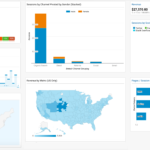The Importance of a Website for Small Businesses
In today’s digital age, a business without a website is like a shop without a signboard. The way consumers shop and look for information has shifted dramatically towards online platforms. For small businesses, having a website is no longer a luxury, but a necessity. Here’s why it’s crucial for every small business to have a website:
1. Credibility and Professionalism
Consumers often check online before making a purchase. A business without a website can raise questions about its legitimacy. A well-designed website provides an image of professionalism and credibility, reassuring potential customers that your business is established and trustworthy.
2. Always Accessible
Unlike your physical store or office that might have limited working hours, a website is accessible 24/7. This means potential clients can find out about your products or services at any time, increasing the chances of generating leads or sales even outside of typical business hours.
3. Cost-Effective Advertising
Traditional advertising can be expensive and its reach limited. However, a website acts as a constant online brochure, showcasing your services or products. Paired with digital marketing strategies, it can be a cost-effective way to reach a wider audience.
4. Reach a Broader Market
Your website can be accessed from anywhere in the world. This means you can cater to a broader audience, rather than just those in your locality. Whether you offer products that can be shipped worldwide or digital services, your market potential expands immensely with a website.
5. Showcase Your Work
A website provides a platform to display testimonials, portfolios, and case studies. For service-based businesses like interior designers, photographers, or consultants, showcasing past work can convince potential clients of your capability and expertise.
6. Improved Customer Service
With features like chatbots, FAQ sections, and online contact forms, websites facilitate easy and quick communication. Customers can get their queries resolved or gather information without waiting in lines or being put on hold.
7. Data Collection and Analytics
Websites allow businesses to collect data about their visitors. With tools like Google Analytics, you can find out how many people visited your site, their location, which pages they browsed, and how much time they spent. This invaluable data helps in refining marketing strategies and improving user experience.
8. SEO Benefits
Search Engine Optimization (SEO) is a practice that helps your website rank higher on search engines. When someone searches for a product or service you offer, having an optimized website increases the chances of them finding you, rather than your competitors.
9. Competitive Advantage
Simply put, if you don’t have a website and your competitors do, they have a clear advantage. They can reach more people, showcase their work, and build a digital presence that you can’t.
10. Integration with Social Media and Marketing Platforms
Websites can be integrated with social media, email marketing platforms, and other digital tools, creating a seamless flow of information and a consolidated online presence.
In conclusion, having a website for your small business is an indispensable tool in today’s digital era. It not only helps you establish credibility but also provides numerous benefits that aid in the growth and expansion of your business. Investing in a professional, user-friendly website is not an expense, but rather a smart investment in your business’s future.




